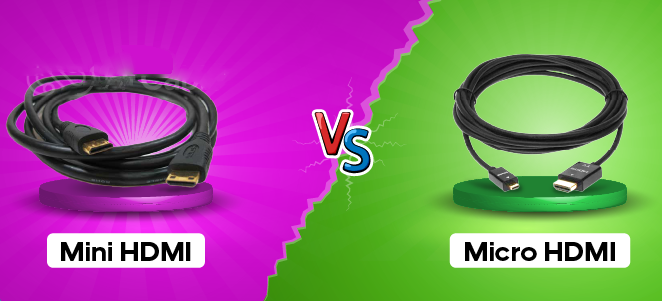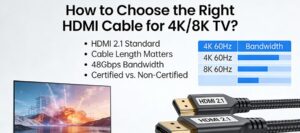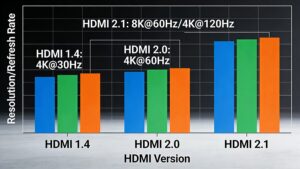In the world of high – definition multimedia connections, HDMI has long been the standard for transmitting audio and video signals. As technology has advanced, and devices have become more compact, smaller versions of the HDMI connector have emerged. Two such variants are Mini HDMI and Micro HDMI. Let’s take a closer look at the differences between them.
Size Matters
The most obvious difference between Mini HDMI and Micro HDMI lies in their size.
- Mini HDMI: Also known as HDMI Type C, it has a connector size of 10.42 mm × 2.42 mm. It is about 60% smaller than the standard HDMI connector (Type A). This size makes it suitable for devices where space is a bit more constrained, but not as severely as in ultra – compact devices.
- Micro HDMI: Referred to as HDMI Type D, it is significantly smaller, measuring 6.4 mm × 2.8 mm, which is about 72% smaller than the standard HDMI. It is the smallest of the HDMI connector types.

Compatibility and Usage
Mini HDMI
- Common Devices: Mini HDMI is often found on devices such as slim laptops, some digital cameras, camcorders, and DSLR cameras. For example, many older models of Sony and Canon camcorders use Mini HDMI ports. This is because the slightly larger size of the Mini HDMI connector can provide a more stable connection in devices that may be moved around during use, like cameras being carried around while filming.
- Compatibility: To connect a device with a Mini HDMI port to a standard HDMI – equipped display (like a TV or a computer monitor), you can use a Mini HDMI to HDMI adapter or a cable with a Mini HDMI connector on one end and a standard HDMI connector on the other.
Micro HDMI
- Common Devices: Micro HDMI was mainly designed for smartphones and smaller video recording devices. In the past, smartphones like the Nokia N8 and some Motorola models had Micro HDMI ports. Action cameras such as certain models of GoPro also used Micro HDMI for connecting to larger displays. However, with the rise of USB – C, the use of Micro HDMI in smartphones has become less common.
- Compatibility: Similar to Mini HDMI, a Micro HDMI to HDMI adapter or cable is needed to connect a device with a Micro HDMI port to a standard HDMI display. But due to its smaller size, finding the right adapter or cable might be a bit more challenging in some cases.
Functionality
Both Mini HDMI and Micro HDMI have 19 pins, and they are capable of transmitting high – definition audio and video signals, just like the standard HDMI. They support resolutions up to 1080p and sometimes even 4K, depending on the device and the HDMI version they comply with. For example, if a device with a Mini HDMI or Micro HDMI port supports HDMI 1.4, it can handle 4K resolution at 30Hz. However, neither Mini HDMI nor Micro HDMI is designed to deliver power to the connected device, unlike some USB – C implementations.
Comparison Table
|
Feature
|
Mini HDMI (Type C)
|
Micro HDMI (Type D)
|
|
Connector Size
|
10.42 mm × 2.42 mm
|
6.4 mm × 2.8 mm
|
|
Common Devices
|
Slim laptops, digital cameras, camcorders
|
Smartphones (older models), action cameras
|
|
Power Delivery
|
No
|
No
|
|
Ease of Finding Adapters/Cables
|
Relatively easier
|
Slightly more difficult
|









